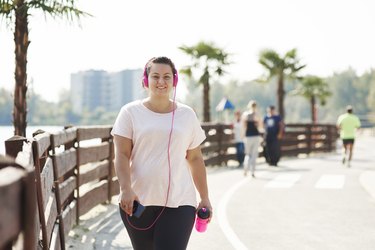
Exercise has some pretty amazing benefits for our bodies that go far beyond weight loss and appearances. It should come as no surprise, then, that regular physical activity can help with the symptoms of irritable bowel syndrome (IBS).
But keep in mind that certain types of exercise may be better than others for IBS sufferers, and too much can sometimes backfire. Here's a closer look at that delicate balance.
Why Is Exercising Good for IBS?
1. It Can Reduce Anxiety
"Exercise is anxiety-relieving, and anxiety often plays a big role in IBS symptoms," Emily Van Eck, RDN, a New Orleans-based registered dietitian-nutritionist who specializes in GI disorders, tells LIVESTRONG.com. "We see people who struggle with anxiety experience more intense and frequent IBS symptoms like constipation, bloating and gas."
Related Reading
Indeed, a January 2011 study published in the American Journal of Gastroenterology found that IBS patients who upped their exercise levels experienced a significant decrease in IBS-related symptoms.
2. It Can Help Relieve Constipation
Exercise can be particularly important if you have irritable bowel syndrome and struggle with constipation. That's because exercise speeds up the time it takes food to move through your large intestine, explains Gina Sam, MD, MPH, a gastroenterologist at Mount Sinai Hospital in New York City. As a result, your body absorbs less water from your stool, which makes it easier to pass.
Getting moving also speeds up your breathing and heart rate, which may also help stimulate the contraction of muscles in your GI tract. "If these muscles squeeze better, you'll be able to move bowel movements out more easily," Dr. Sam says.
3. It May Improve Your Sleep
Finally, exercise tends to help people sleep better, Van Eck says, and sleep can play a major role in overall health, including digestive health.
Lack of sleep puts stress on the body, which triggers blood and nutrients to be diverted away from the gut to other parts of the body, Anil Rama, MD, doctor of sleep medicine at the Stanford Center for Sleep Sciences and Medicine, tells LIVESTRONG.com.
"That means whatever food is in your stomach won't face the normal acid and bile secretions, the contractions by the gut to move the food along will be reduced and absorption of the food will be delayed," Dr. Rama says.
The result? Constipation, diarrhea, bloating and pain.

5 IBS-Friendly Exercises
A review of 14 studies published February 2019 in the journal Neurogastroenterology and Motility found that many different types of moderate-intensity, low-impact exercise appear to relieve IBS symptoms, including the following.
1. Walking
It may sound simple, but walking has been linked to all sorts of health benefits, many of which can positively affect IBS symptoms.
When combined with a bit of meditation, just 10 minutes of walking a day can help boost your mental health and ease anxiety, according to a July 2018 study in Health Promotion Perspectives.
Taking your walk into the great outdoors for 20 minutes can decreases your cortisol levels, helping you feel less stressed, according to an April 2019 study in Frontiers in Psychology.
"I recommend that all of my patient with IBS include at least one day a week where they are doing slow, mindful exercise like a slow walk in nature," Van Eck says. "This type of movement can calm the mind and body, which can calm the digestive system, too."
And speaking of digestion, a June 2013 study in Diabetes Care showed that walking post-meal can clear glucose from your bloodstream, which helps move food through your system more efficiently.
2. Yoga
While aerobic exercise is important, there's good research to suggest more mindfulness-based activities such as yoga can help, too.
"It's a great option, not just because it keeps you moving, but also because it helps relieve stress, which we know can worsen IBS-related symptoms," Dr. Sam says.
People with IBS who practiced yoga for an hour for three days a week for 12 weeks reported improvements in both symptoms and quality of life compared to those who didn't do downward-facing dog, according to a December 2015 study published in the European Journal of Integrative Medicine.
While any type of yoga can help, some moves may be especially good for IBS. "There are some yoga poses that are known to be used for improved digestion, like twists and locust pose," says Van Eck.
She recommends hero pose, a gentle seated posture, to help calm your digestive system after meals.
If you feel like your anxiety is worsening your IBS, she suggests calming postures like legs up the wall, child's pose and happy baby.
Related Reading
3. Breathing Exercises
You may not think breathing exercises "count" as, well, exercise, but it's a good idea to include them in your routine, too.
People with IBS who participated in a nine-week relaxation program that included meditation and deep breathing for 15 to 20 minutes a day reported improvements in their symptoms, according to an April 2015 study published in the journal PLOS One.
One good exercise to try, according to the IFFGD, is diaphragmatic breathing:
- Place your hand just above your belly button, close your eyes and take a long, slow, deep breath in to the count of four, bringing it all the way down into your stomach (you should feel your hand rise as you inhale).
- Pause, then exhale slowly to the count of four through either your nose or mouth.
- You can also say a word or mantra as you inhale and exhale, to help you concentrate.
- Repeat five to 10 times.
Related Reading
4. Tai Chi
When it comes to a low-impact workout with big benefits, you can't do a whole lot better than tai chi, the Chinese martial art that incorporates intentional, fluid motions that aim to connect your mind and body.
As a form of meditation in motion, tai chi can decrease stress, anxiety and depression, according to the Mayo Clinic. Some research also indicates that it can improve sleep quality and improve overall wellbeing.
Related Reading
5. Moving Throughout the Day
You should also try to stay active during the day as much as possible. When you sit for long periods, it slows down the passage of food through your digestive tract, which can worsen IBS-related symptoms like bloating, Dr. Sam says.
If your job is mostly sedentary, the International Foundation for Gastrointestinal Disorders (IFFGD) recommends taking regular breaks to keep things moving, both literally and figuratively.

Can Exercise Make IBS Worse?
While regular exercise is a good idea for just about anyone who has IBS, Dr. Sam says, some types of physical activity can make symptoms worse when you're experiencing a flare-up.
While each person is different, the following exercises are best avoided unless you're feeling 100 percent.
1. High-Level Endurance Exercise
If you're prone to diarrhea, or are going through a bout of it, then you'll want to hold off on your marathon or triathlon training.
That's because this type of endurance exercise can actually trigger diarrhea. "When you're performing that level of activity, blood flow is going from your gut to other muscles in your body, like your heart," Dr. Sam explains.
This in turn can cause stomach upset that leads to the runs.
2. High-Intensity Exercise Like HIIT
In addition, intense exercise like high-intensity interval training can encourage the release of stress hormones like cortisol, which can make diarrhea worse.
If you're exercising intensely for more than a half hour a day and notice IBS symptoms flaring, Van Eck recommends toning it down.
"When the body is burning too many calories, digestion can become impaired," she adds.
If this happens, she recommends switching to more moderate activity, like brisk walking, for 30 minutes a day, five days a week.
Is this an emergency? If you are experiencing serious medical symptoms, please see the National Library of Medicine’s list of signs you need emergency medical attention or call 911.